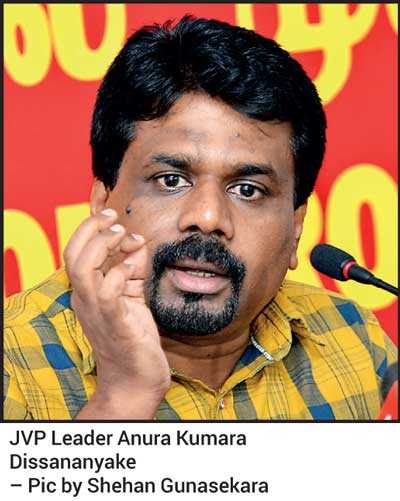Sunday Feb 15, 2026
Sunday Feb 15, 2026
Monday, 17 December 2018 00:00 - - {{hitsCtrl.values.hits}}
Ranil Wickremesinghe has reclaimed his Prime Ministership, not because he deserved it but because of President Sirisena’s impulsive irrationality driven by hunger for power and because of a determined commitment by JVP, TNA and Muslim parliamentarians to rescue democracy from the brink of destruction engineered by a conspiratorial cabal. Above all and most importantly, it is the country’s Supreme Court with its utmost impartiality, integrity and independence amidst unwarranted doubts, baseless rumours and malicious speculations that finally restored sanity out of nearly two months of chaos. In total, the resurrection of the UNP Government is the only sensible alternative. The biggest question facing the nation now is ‘quo vadis’? 
Although democracy has been restored there is little room for complacency, because the nation is not totally out of the woods. The economy has to be rebuilt, international confidence restored, budgetary problems addressed and clean government or ‘yahapalana’ guaranteed. Even if the UNP Government is allowed to run its full term of office until 2020, the country desperately needs another alternative to the UNP-SLFP/SLPP hackneyed two-party race.
This is not a phenomenon unique to Sri Lanka. In several other democratic polities too including those in Western countries, voters are getting increasingly frustrated at the underperformance of the two-party system and the increasing similarity in policies and programs between them. Capitalism with its neoliberal economic ideology has captured the manifestos and campaign platforms of the contestants, to benefit the rich abundantly at the expense of the poor and vulnerable. These voters are therefore shifting allegiance towards a third alternative, which unfortunately is dominated by the far-right.
As the far-right erodes into traditional vote banks of major parties, the latter in turn are forced to reshape their manifestos with subtle inclusions of far-right policies. For instance, while the far-right in Europe, UK, US and Australia openly advocates Islamophobia to get rid of Muslim minorities, traditional parties advocate the same but under a more electorally palatable policy of immigration control and border security. This is their undercover Islamophobia devised to distract voters from more pressing issues about economy and welfare.
One can witness a similar trend in Sri Lanka also in recent times, especially during and after the civil war. The rising popularity of far right parties like Jathika Hela Urumaya, Sinha Le and Bodu Bala Sena – all backed by varied vested interests including minority elements from the sangha and foreign powers – have forced the two national parties to sing the far-right racist chorus but in soothing tunes. Both UNP and SLFP/SLPP address different ethnic audience with different ethnic messages and keep the country continuously divided. This is why the country still remains divided and in imbroglio on the ethnic issue.
As long as that issue remains unresolved peace and development of the country will be hamstrung. In a plural society no single component of that plurality however large that may be can move that society forward with peace and prosperity. It is this truism, which marks the difference between a highly successful and prosperous Singapore and disappointingly failed and impoverished Sri Lanka.
It is in this context that one should consider the role of JVP as a viable and promising third alternative. True, this party has a bloody past soiled in juvenile revolutionary romanticism. Having paid a heavy price for that delinquency however, it has now changed over a new leaf and evolved into a more matured democratic political alternative with demonstrable pragmatism. The way it has conducted itself in the current Parliament in general and in the constitutional crisis in particular has proved its democratic and patriotic mettle. 
Of course, there will be critics who will pick instances here and there from the recent past and present to dispute this thesis. However, in rough and tumble of politics compromises over crucial issues are sometimes demanded from any leadership without surrendering its fundamental principles and policies.
The fact that JVP, unlike the other ‘rathu sahotharayas’, is a party with a rural Buddhist base is an incredible advantage because, historically, it was with that rural support ancient monarchs successfully built a resplendent but peaceful, prosperous and pluralist Sri Lanka that lasted even under colonial oppression. After independence however, an emotionally driven, urban biased and ethnically divisive party politics poisoned the rural Buddhist mass and ruined its inherited quality of compassion and cosmopolitanism. It is therefore the task of the JVP to resurrect these rural qualities with a solid campaign and workable program.
That campaign should convince the rural Buddhists first and others later that Sri Lanka is a nation belonging to everyone, be it Sinhalese, Tamil or Muslim. Unlike the two major parties JVP should not speak with forked tongue. Its messages should be the same but in languages directly understandable to listeners, whether in Colombo, Kandy, Galle, Jaffna, or anywhere else. Those messages must be one of inclusion and not exclusion, patriotic and not parochial, regional or sectarian, humanist and not predatory and above all sincere and not opportunistic. Until now all political campaigns by all so called national and regional parties have been exclusionary, parochial, predatory and opportunistic.
The third alternative under JVP may not be achievable in 2020 or earlier but a dedicated campaign along the suggested line should bring respectable outcome in the medium term. Are Anura Kumara Dissananyake and his lieutenants ready to take up the challenge?
(The writer is from School of Business and Governance, Murdoch University, Western Australia.)